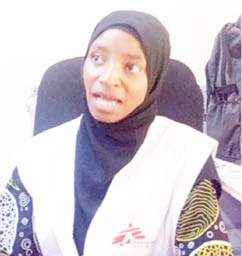Jahun General Hospital is one of the health facilities in the country where Médecins Sans Frontières (MSF) provides free deliveries, emergency obstetrics , newborn care and fistula repairs.
MSF which is an international non-governmental organization that provides humanitarian medical care
also provides free food for women on admission, among other incentives.
Jahun , a local government area of Jigawa State has been known across Nigeria and some neighbouring states in Niger Republic due to works of MSF in addressing the maternal and newborn health, fistula problem and other health-related matters.
NIGERIA DAILY: Real Reason Tailors Disappoint
Reps will intervene in electricity tariff hike – Kalu
In the bustling emergency ward of Jahun General Hospital’s maternity department, the rhythm of activities beats with urgency and determination, like a pulse in the air. In the hospital, MSF collaborates with the Jigawa State Ministry of Health to provide comprehensive emergency obstetrics, v newborn care and fistula care.
Since commencing services in 2008, MSF teams have provided 90,000 deliveries.
Nigeria is the third country in the world, after South Sudan and Chad, where a woman is most likely to die giving birth, according to the World Health Organisation ( WHO); with an average of more than 1,000 maternal deaths per 100,000 live births, as set under the UN sustainable Development Goals (SDGs).
Maternal mortality rates exceed the country’s average in northern Nigeria, where more than half of the country’s estimated 200 million people live.
In Jigawa State, the most significant factor is the limited access pregnant women have to antenatal care and delivery care for complications in childbirth.
Unity Enuebuke, MSF Nursing Activity manager, has been working in Jahun General Hospital for more than 10 years. “We see a lot of women with serious complications, with the most common ones being anaemia, a hemorrhage and eclampsia, “ She explains.
She said, “We regularly have up to two women sharing a bed, and depending on the type of complications we see, things can escalate very quickly. “
Ramatu, a mother of two, suffered life-threatening eclampsia, seizures due to high blood pressure, when she delivered her first baby in the Jahun General hospital.
This is her second time here,. “I live five hours away from Jahun General Hospital. “There is no hospital where I live, and the closest one does not open at night, “ she said.
In Jigawa State, many of the estimated 749 primary healthcare centres do not have adequate drugs, healthcare workers and medical equipment to serve the thousands of women of child-bearing age; despite efforts from public health authorities, the current healthcare infrastructure does not come close to meeting the needs of the population.
This dire situation leaves pregnant women who want to attend a healthcare facility with limited choices such as giving birth at home, and if complications arise, embarking on a treacherous journey to try to reach one that is functioning.
It is also not enough that healthcare facilities are available; they must also be affordable. The economic reality in this region, worsened by soaring inflation rates, makes it difficult for people to afford hospital fees, drugs or even transportation to health facilities.
The result is that women become hesitant to go to the hospital, preferring to give birth at home with the help of more affordable traditional birth attendants, hence increasing the risk of experiencing complications.
Women have given birth at home for centuries, but mothers and babies’ survival can hinge on preparing and planning for managing complications, which may also occur without warning.
In Jigawa State, health professionals and facility-based delivery rates remain low with up to around 80 per cent of deliveries occurring at home.
Nurse Unity said, “Most times, family members don’t bring the mother to the hospital; even when they see that the baby is not coming out and the mother herself starts having seizures. “
Khadija, a 58-year-old traditional birth attendant in Aujara community, Jigawa State, understands the value of hospital care if she can’t manage a complication, but has experienced women’s hesitation firsthand. “Some women take my advice when I say they should go to the hospital, while some refuse to go to the hospital because they say that they are used to giving birth at home,” she said.
In many communities in Jigawa State, pregnant women often require permission from their husbands or mothers-in-law to visit hospitals. This practice is compounded by a trend of early marriage, at an age when women are not fully informed about pregnancy and are not physically ready to carry a child.
Khadija explained that for some, “it is their husbands that prevent them from going to the hospital. Some men don’t see the relevance of antenatal care, while others don’t want another man to treat their wives. “
Experts said to tackle maternal mortality, a multitude of factors must be addressed. State authorities and international organisations must scale up their activities and increase funding to healthcare in the region, ensuring that budget allocations for primary healthcare centres are properly utilised and thorough planning and strict implementation processes are in place.
They said pregnant women must be encouraged to go for antenatal care where they can be informed about their pregnancy journey and what to expect.
Efforts must also be made to mitigate cultural practices that hinder women from seeking care in medical facilities. Women should be allowed agency and given freedom to make decisions for their health.
In 2023, MSF teams assisted 15,754 deliveries, performed 1,911 caesarean sections and completed 43,785 antenatal consultations. Yet, it is still a drop in the ocean when looking at the needs of women in Jigawa State.
Primary healthcare facilities, which are often the first point where pregnant women seek healthcare, need to be equipped with trained personnel, equipment and resources to manage childbirth-related complications. “Eighty-two per cent of the cases we receive at Jahun General Hospital are complicated cases that could have been prevented at the primary healthcare level,” says Abdulwahab Mohamed, MSF medical coordinator.
“Women, especially those of child-bearing age, also have to be informed about their health and well-being through health empowerment programmes led by state authorities or other health stakeholders,” he added.
MSF supports the Jigawa State Ministry of Health in providing comprehensive emergency obstetrics and newborn care.
“Our support started with vesicovaginal fistula repair in 2008. However, the project evolved into a 161-bed facility to care for pregnant women and newborns experiencing complications,” Mohamed said.
MSF teams also provide maternal and neonatal healthcare in the states of Kano, Benue, Cross Rivers, Zamfara and will open a large maternity hospital in Maiduguri in June 2024.
Doctor Fatima Aliyu, MSF medical team lead in Jahun Urban General Hospital, said they work in Taura and Miga local governments to decongest the Jahun centre.
Aliyu said they received about 11 thousand patients in 2023 in Jahun General Hospital where it only realised 0.7 per cent deaths.
She said they received 800 to 900 pregnant women in the hospital.
She said the Jigawa State government on its part provided a programme called ‘Haihuwa Lafiya’ which assisted women from the rural communities to access hospital for deliveries.

 Join Daily Trust WhatsApp Community For Quick Access To News and Happenings Around You.
Join Daily Trust WhatsApp Community For Quick Access To News and Happenings Around You.


